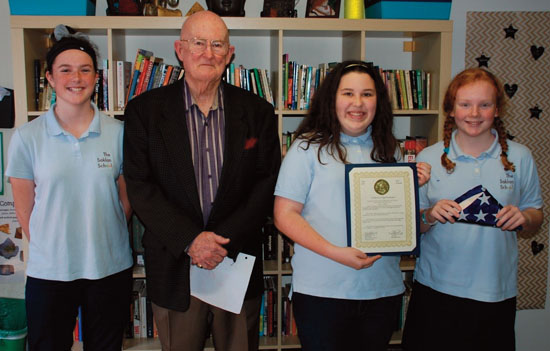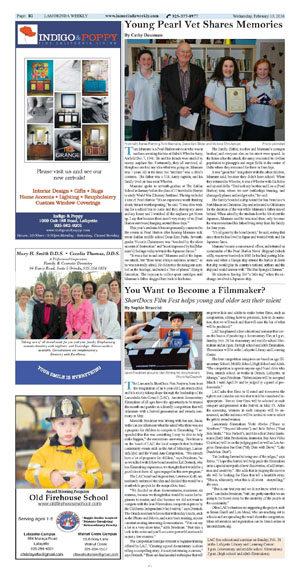|
|
Published February 10th, 2016
|
Young Pearl Vet Shares Memories
|
|
| By Cathy Dausman |
 |
| From left: Renee Fleming, Tom Marnane, Diana Van Gilder and Victoria Christensen Photo provided |
Tom Marnane is a Pearl Harbor survivor who was in uniform awaiting his bus at Oahu's Wheeler Army Airfield Dec. 7, 1941. He and his friends were strafed by enemy airplane fire. Fortunately, they all survived, although no one had any idea what was going on. Marnane was 7 years old at the time; his "uniform" was a child's costume. His father was a U.S. Army captain, and his family lived on base near Wheeler.
 Marnane spoke to seventh-graders at The Saklan School in January before the class of 17 traveled to Hawaii to study World War II history firsthand. The trip included a tour of Pearl Harbor. "It's an experience worth thinking about, but not worth repeating," he said. "I was alive waiting for a school bus to come and they shot up my street and my house and I watched all the airplanes get blown up. I say that because there aren't very many of us (Pearl Harbor survivors) hanging around these days."
Marnane spoke to seventh-graders at The Saklan School in January before the class of 17 traveled to Hawaii to study World War II history firsthand. The trip included a tour of Pearl Harbor. "It's an experience worth thinking about, but not worth repeating," he said. "I was alive waiting for a school bus to come and they shot up my street and my house and I watched all the airplanes get blown up. I say that because there aren't very many of us (Pearl Harbor survivors) hanging around these days."
 This year's students felt more personally connected to the events at Pearl Harbor after hearing Marnane talk, wrote Saklan middle school Dean Kim Parks. Seventh-grader Victoria Christensen was "touched by the sheer amount of destruction" and "most impressed by his [Marnane's] feelings today towards the Japanese forces."
This year's students felt more personally connected to the events at Pearl Harbor after hearing Marnane talk, wrote Saklan middle school Dean Kim Parks. Seventh-grader Victoria Christensen was "touched by the sheer amount of destruction" and "most impressed by his [Marnane's] feelings today towards the Japanese forces."
 "It was a fast in and out," Marnane said of the Japanese attack, but "there were always airplanes around," so he was not really afraid. He did notice the rising sun symbol on the fuselage, and noted a "line of planes" flying in formation. The boys ran to collect spent cartridges until Marnane's father dragged him back to his house.
"It was a fast in and out," Marnane said of the Japanese attack, but "there were always airplanes around," so he was not really afraid. He did notice the rising sun symbol on the fuselage, and noted a "line of planes" flying in formation. The boys ran to collect spent cartridges until Marnane's father dragged him back to his house.
 The family (father, mother and Marnane's younger brother) and everyone else on his street were spared. In the hours after the attack, the army evacuated its civilian population to pineapple and sugar fields in the center of Oahu where they remained for three or four days.
The family (father, mother and Marnane's younger brother) and everyone else on his street were spared. In the hours after the attack, the army evacuated its civilian population to pineapple and sugar fields in the center of Oahu where they remained for three or four days.
 It was "great fun" being there with the other children, Marnane said, because they didn't have school. When they returned to Wheeler, it was a Wheeler with fox holes and air raid drills. "Dad took my brother and I on a (Pearl Harbor) tour, where we saw battleships burning, and (damaged) planes and midget subs," he said.
It was "great fun" being there with the other children, Marnane said, because they didn't have school. When they returned to Wheeler, it was a Wheeler with fox holes and air raid drills. "Dad took my brother and I on a (Pearl Harbor) tour, where we saw battleships burning, and (damaged) planes and midget subs," he said.
 The family boarded a ship bound for San Francisco's Fort Mason on Christmas Day and relocated to Oklahoma for the duration of the war while Marnane's father stayed behind. When asked by the students how he felt about the Japanese, Marnane said he was mad then, only because the war necessitated his father living away from his family for four years.
The family boarded a ship bound for San Francisco's Fort Mason on Christmas Day and relocated to Oklahoma for the duration of the war while Marnane's father stayed behind. When asked by the students how he felt about the Japanese, Marnane said he was mad then, only because the war necessitated his father living away from his family for four years.
 "It's all gone by the board (now)," he said, noting that since then he has lived in Japan and worked with and for Japanese firms.
"It's all gone by the board (now)," he said, noting that since then he has lived in Japan and worked with and for Japanese firms.
 Marnane became a career naval officer, and returned as commander of the Pearl Harbor Naval Shipyard (which oddly, was never bombed) in 1980 for his final posting. Marnane said when a foreign ship entered the harbor at dawn that ship would play its country's national anthem and the shipyard would answer with "The Star Spangled Banner."
Marnane became a career naval officer, and returned as commander of the Pearl Harbor Naval Shipyard (which oddly, was never bombed) in 1980 for his final posting. Marnane said when a foreign ship entered the harbor at dawn that ship would play its country's national anthem and the shipyard would answer with "The Star Spangled Banner."
 He admits to having felt "a little tug" when the exchange involved a Japanese ship.
He admits to having felt "a little tug" when the exchange involved a Japanese ship.

|
|
|
|
|
|
|
|
|
| |
|
|
|
|



